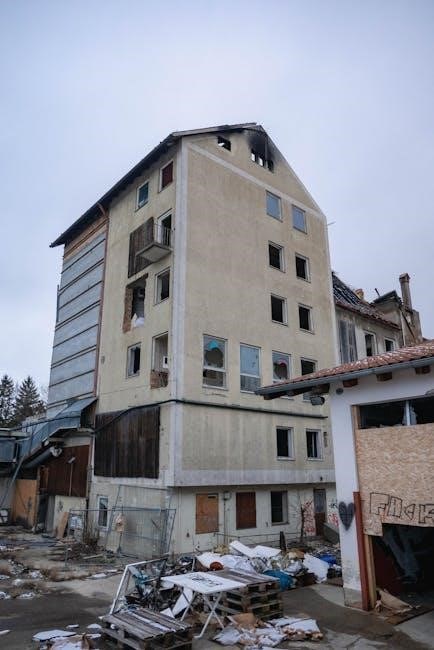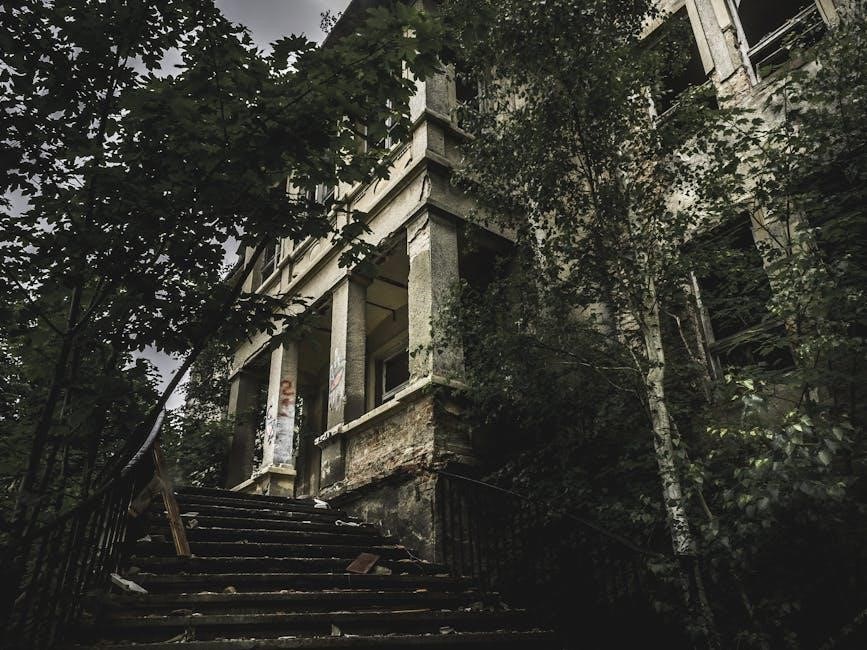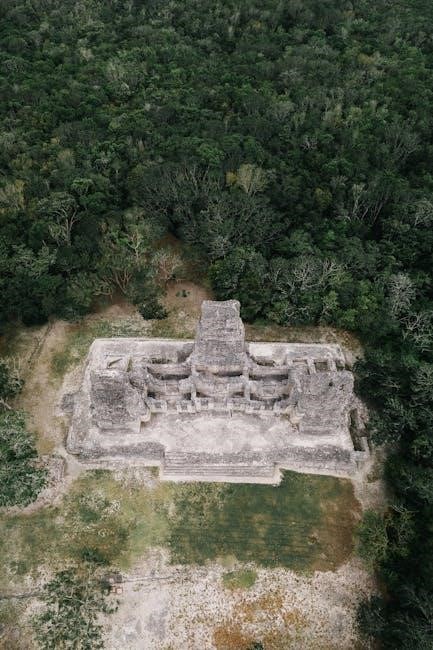
Ruin and Rising concludes Leigh Bardugo’s Grisha Trilogy‚ delivering an epic finale to Alina’s journey. The story explores themes of power‚ resilience‚ and morality‚ captivating readers worldwide.
Overview of the Grisha Trilogy
The Grisha Trilogy‚ written by Leigh Bardugo‚ is a captivating young adult fantasy series set in the fictional world of Ravka. It follows the journey of Alina Starkov‚ a young orphan who discovers her extraordinary Grisha abilities. The trilogy consists of Shadow and Bone‚ Siege and Storm‚ and Ruin and Rising. Each installment delves into themes of power‚ identity‚ and morality‚ weaving a dark fantasy narrative filled with magic‚ romance‚ and political intrigue. The series is renowned for its rich world-building and complex characters‚ with Ruin and Rising serving as the climactic conclusion to Alina’s story.
The Significance of “Ruin and Rising” as the Final Installment
Ruin and Rising serves as the climactic conclusion to Leigh Bardugo’s Grisha Trilogy‚ tying together the intricate plot threads and character arcs established in the first two books. It marks the culmination of Alina’s journey‚ exploring her struggle with power‚ identity‚ and morality. The novel delivers an emotionally charged finale‚ resolving key conflicts while leaving a lasting impact on readers. As the final installment‚ it solidifies the trilogy’s legacy in young adult fantasy literature‚ offering a satisfying yet poignant ending to Alina’s story. The book’s themes of resilience and sacrifice resonate deeply‚ making it a memorable conclusion to the series.

Plot Summary of “Ruin and Rising”
Ruin and Rising follows Alina as she seeks the final amplifier to defeat the Darkling and save Ravka. The story unfolds with intense battles‚ unexpected alliances‚ and a climactic showdown.
Alina’s Quest for Power and Identity
Alina’s journey in Ruin and Rising is marked by her relentless pursuit of power and self-discovery. As she searches for the final amplifier‚ she grapples with the weight of her destiny and the moral complexities of wielding immense power. Her transformation from a timid orphan to a powerful Grisha is central to the narrative‚ exploring themes of identity‚ sacrifice‚ and the burden of leadership. Through her struggles‚ Bardugo delves into the internal conflict of balancing personal ambition with the greater good‚ making Alina a deeply relatable and compelling protagonist.
The Darkling’s Rule and Alina’s Alliances
The Darkling’s tyrannical grip on Ravka intensifies‚ as he seeks to expand his shadowy dominion. Alina‚ determined to counter his power‚ forges unexpected alliances with rebels‚ Grisha‚ and even former adversaries. Her bond with Mal remains a steadfast anchor amidst the chaos. As the Darkling’s rule grows more oppressive‚ Alina must navigate the intricate web of loyalty‚ betrayal‚ and sacrifice. The tension between her desire to protect her people and the temptation of absolute power drives the narrative‚ while the Darkling’s enigmatic presence continues to haunt her every move. Their intertwined fates set the stage for a climactic confrontation.

Themes and Symbolism
Ruin and Rising explores themes of resilience‚ power‚ and self-discovery‚ set against the symbolic backdrop of Ravka’s struggle‚ reflecting the darker aspects of human nature.
Exploration of Resilience and Perseverance
In Ruin and Rising‚ Leigh Bardugo masterfully explores resilience and perseverance through Alina’s journey. Alina faces immense challenges‚ from the Darkling’s rule to her own internal struggles‚ yet she consistently finds strength to endure. Her quest for power and identity becomes a metaphor for resilience‚ as she battles both external forces and her own doubts. The novel highlights how perseverance shapes her decisions and relationships‚ ultimately defining her path. The amplifiers and their significance symbolize the cost of power and the enduring human spirit. Through Alina’s story‚ Bardugo illustrates that true resilience lies not in the absence of fear but in the courage to act despite it.
The Nature of Power and Morality
Ruin and Rising delves deeply into the nature of power and morality‚ exploring how both can corrupt and elevate individuals. Alina’s journey highlights the dual nature of power‚ as she grapples with the amplifiers’ influence and her own moral compass. The Darkling’s rule exemplifies the dangers of unchecked power‚ while Alina’s choices reflect her struggle to maintain her humanity amidst overwhelming force. The novel raises questions about the cost of sacrifice and the fine line between heroism and destruction. Through these themes‚ Bardugo challenges readers to consider whether power inherently corrupts or if it can be wielded for the greater good‚ leaving a lasting impact on the Grishaverse legacy.

Character Development
Ruin and Rising masterfully explores Alina’s transformation from a timid orphan to a powerful leader‚ while the Darkling’s complexities and Mal’s unwavering loyalty deepen the narrative’s emotional core.
Alina’s Transformation Throughout the Trilogy
Alina’s journey in Ruin and Rising marks a profound transformation‚ evolving from a timid orphan into a resilient leader. Her quest for power amplifiers tests her identity and morality‚ as she grapples with the weight of destiny. The amplifiers‚ particularly the firebird and the ice wolf‚ symbolize her internal struggle between light and darkness. Alina’s relationships with Mal and the Darkling further shape her character‚ revealing her capacity for sacrifice and love. By the trilogy’s end‚ she emerges as a symbol of hope and resilience‚ embodying the theme that true strength lies not in power‚ but in perseverance and self-discovery.
The Role of Secondary Characters in the Conclusion
Secondary characters in Ruin and Rising play pivotal roles in shaping the conclusion. Figures like Mal and the Darkling significantly influence Alina’s decisions and Ravka’s fate. Their alliances and conflicts drive the narrative‚ showcasing their depth. Mal’s unwavering support contrasts with the Darkling’s manipulative strategies‚ both affecting Alina’s path. These characters’ arcs contribute to the trilogy’s resolution‚ highlighting themes of loyalty and sacrifice. Their roles are essential in bringing the story to its epic finale‚ emphasizing that even secondary figures can shape the world’s destiny with their actions and decisions.
The Grishaverse and Its Impact
The Grishaverse‚ created by Leigh Bardugo‚ has captivated audiences worldwide with its immersive storytelling and richly crafted world. Ruin and Rising solidified its cultural impact‚ expanding into TV‚ games‚ and inspiring countless fans.
Leigh Bardugo’s World-Building and Legacy
Leigh Bardugo’s Grishaverse is renowned for its meticulous world-building‚ blending Slavic mythology with dark‚ intricate magic. In Ruin and Rising‚ Bardugo masterfully concludes Alina’s journey‚ enriching Ravka’s lore and cementing her legacy in YA fantasy. The trilogy’s success has inspired adaptations and spin-offs‚ showcasing her enduring influence. Her ability to craft relatable characters and immersive settings has set a new standard in the genre. Fans and critics alike praise her storytelling‚ ensuring her work remains a cornerstone of modern fantasy literature.
The Cultural and Thematic Significance of Ravka
Ravka‚ as depicted in Ruin and Rising‚ serves as a richly crafted backdrop that explores themes of identity‚ resilience‚ and the struggle for power. Drawing inspiration from Slavic mythology‚ Leigh Bardugo weaves a cultural tapestry that immerses readers in Ravka’s unique heritage. The nation’s fractured lands and divided people mirror the internal conflicts of its characters‚ particularly Alina. The cultural significance of Ravka lies in its ability to transcend mere setting‚ becoming a character in its own right. This thematic depth enhances the story’s emotional resonance‚ making Ravka a memorable and integral part of the Grishaverse legacy.

Reception and Reviews
Ruin and Rising received widespread acclaim for its emotional depth and satisfying conclusion. Critics praised Leigh Bardugo’s masterful storytelling‚ while fans celebrated the trilogy’s impactful legacy in YA fantasy.
Critical Acclaim and Fan Reactions
Ruin and Rising garnered widespread critical acclaim for its emotional depth‚ intricate plotting‚ and satisfying conclusion. Reviewers praised Leigh Bardugo’s masterful storytelling and the trilogy’s cohesive narrative arc. Fans celebrated the book’s ability to tie together loose ends while delivering unexpected twists. The novel’s exploration of complex themes resonated deeply with readers‚ solidifying its place in young adult fantasy literature. Many highlighted Alina’s transformative journey and the moral ambiguities presented throughout the series. The book’s release sparked vibrant discussions online‚ with fans sharing their reactions and theories. Its impact continues to be felt‚ cementing the Grisha Trilogy’s legacy as a modern classic in the genre.
The Book’s Place in Young Adult Fantasy Literature
Ruin and Rising stands as a pivotal work in young adult fantasy‚ blending rich world-building with compelling character development. Leigh Bardugo’s Grishaverse has redefined the genre‚ inspiring countless authors and series. The book’s ability to merge Russian folklore with a unique magical system sets it apart‚ offering readers a fresh perspective on fantasy storytelling. Its exploration of complex themes and moral ambiguity has raised the bar for YA literature‚ making it a benchmark for future works. The trilogy’s success has also paved the way for spin-offs and adaptations‚ further cementing its influence on the genre. Ruin and Rising is a testament to the power of storytelling in shaping young adult fantasy.